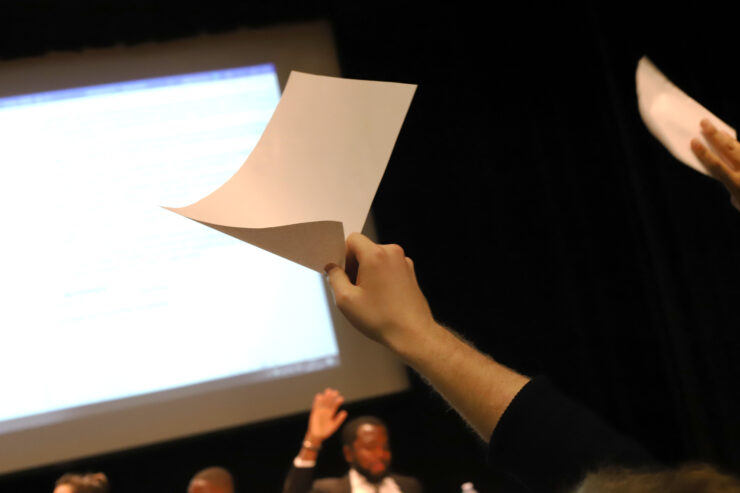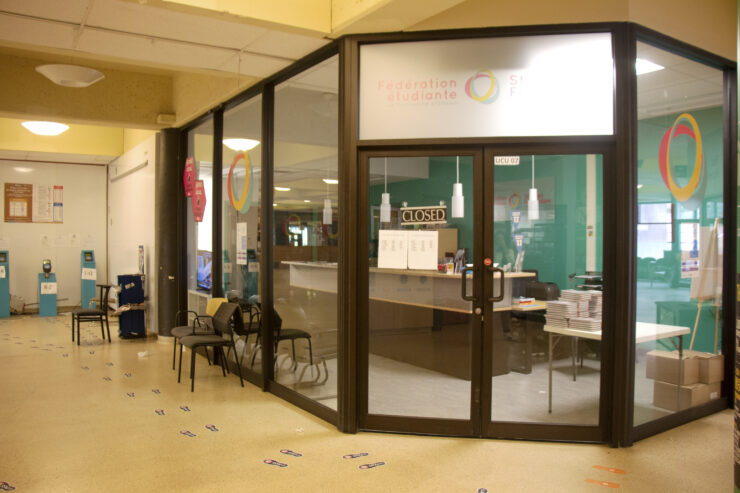Some performers weren’t paid until November 2020
On Feb. 21, the University of Ottawa Students’ Union (UOSU) Executive Oversight Committee (EOC) released a report detailing a delay in remuneration for artists who performed in the Black Student Leaders Association (BSLA) and UOSU produced Black Expression event on July 18, 2020.
The report was the result of a letter sent to the EOC by Jayde Lavoie on Aug. 31, 2020. In her letter, the former UOSU Board of Director member explained that artists and organizations who had been promised an honorarium had yet to receive any compensation six weeks after the original event. Lavoie and her co-signers which included event organizers, artists, and campus stakeholders requested that the EOC undertake an investigation to look into the reasons behind the delay and make sure similar situations can be avoided in the future.
“I had been keeping an eye, as had the BSLA and the other organizers of the event on the payment process and sort of noting on our own that things hadn’t been dealt with yet,” said Lavoie in an interview with the Fulcrum.
“I had also [sent] a series of follow-up [emails] to UOSU … to the then operations commissioner (Ines Nour El-Huda) and copied other members of the executive committee inquiring about what that payment process was going to look like in advance of September.”
Lavoie said that there were no clear timetables as to when the artists and organizers would be remunerated, but that discussions directly following the event were supposed to establish a clear process to pay them in the weeks that followed the event. According to the EOC report, all outstanding payments were made by November to artists and organizers.
“I had sent emails to Babacar, to the University of Ottawa finance representative, to the then operations commissioner and [copied] the advocacy commissioner (Tim Gulliver) to try and set up a meeting to talk about what that process would look like, I want to say maybe days after the event had occurred, or even before that,” said Lavoie.
“We were all operating under the impression that it would happen in the week, two, three at most following [the event] … it was when it got to four or five weeks that I started doing the more pestering side of following up before it had to be elevated to the point of sending a letter to the oversight committee.”
When asked why it took so long to remunerate artists, Babacar Faye, the UOSU’s president cited miscommunication, lack of clear procedures and disorganization.
“It shouldn’t have taken that long … I think that there was a lot of miscommunication and uncertainty in regards to what the procedure was, what the process was for paying the artists as well as the different groups,” said Faye, in an interview with the Fulcrum.
Faye added that the university matching the amount received from donations created confusion as to if UOSU should pay artists upfront or wait until they received the funds. According to the president, other contributing factors to the delay included panning for 101-week and a busy August schedule.
“It should have been a priority to pay the artists as soon as possible,” concluded Faye.
EOC report findings
In its report, the EOC found that there was a lack of communication and coordination when it came to addressing remuneration with artists and organizations.
“There seemed to be a lack of central coordination from the UOSU in terms of communicating with artists and organizations, collecting and retaining information required to make payments, communicating with the university’s central administration to receive its share of the donations, and proactively following up on the various parts of the process,” wrote the committee.
The committee also found that the matching funds model from the university “hindered the process and prolonged the timeframe within which the UOSU could make payments” to artists and organizations involved. It also found that there was a lack of communication from the UOSU to inform artists that they would have to wait several months to receive their honorarium.
Henry Mann, the chair of the EOC, explained in an interview with the Fulcrum that the lack of central organization and communication resulted in emails being left unanswered and ultimately in a delay of payments for artists.
“We found that from the executive side, there was a lack of coordination and communication and a lack of proactively following up on the various parts of the process, which was resulting in, from the organizers’ side, emails being sent that were unresponded to or responded to very late,” said Mann.
“From what we looked into, it definitely seemed that there was a breakdown in the communication side. And that there was definitely room to do better on that front. And as for organization, there was probably room for it to be more expeditious and more direct so that the payments would have been quicker, ultimately.”
The report recommends that in the future, the UOSU chooses a member of the Executive or administration to serve as event lead for an event of this nature. This would reduce the possibility of disorganization as the lead would be responsible for ensuring the collection of contact information of participants so that they are paid in a timely manner. This person would also be responsible for answering any questions or concerns participants may have.
On the matching donation front, it recommends that “UOSU should endeavour to use its fiscal capacity to distribute the agreed-upon amounts to artists and organizations upfront rather than waiting for the matching donations.”
Finally, it recommends that UOSU offers a formal apology to the artists, hosts, and organizations who participated in the Black Expression event.
BSLA disappointed with EOC’s findings
The BSLA’s co-presidents did not mince words when it came to reacting to the situation and the EOC’s findings. In a statement sent to the Fulcrum on March 2, the association first addressed how it felt about the UOSU’s delay in remuneration for artists and organizers.
“We feel the very act of them ‘forgetting’ to remunerate the artists is ironic, anti-black, and defeats the very purpose of the event, which was to uplift/empower black performers,” wrote co-presidents Jinnia Baiye and Yanaminah Thullah.
The heads of the BSLA then went on to directly address the findings and recommendations of the EOC’s report.
“We could simply be complicit in the report’s findings of ‘lack of communication’ but this has happened too many times before.”
“While we appreciate all the recommendations regarding organizational improvements, the recommendation for an apology feels almost disrespectful at this point. We are also aware that we (student organizers including BSLA and Jayde Lavoie) had addressed this and the lack of oversight (initially) in August; as we all know, we are only receiving this report now. The extreme delay in rectifying the compensation issue matched with the extreme delay in assessing the overall issue is disrespectful.”
“We just need/want the oversight committee to be clear that [it] is not simply a passive oversight issue but an active ignorance towards Black initiatives & labour. As an organization that prides itself on actively supporting the Black community this “oversight” and its subsequent report has proven to be in direct contradiction of that notion.”
Finally, the BSLA was also critical of the UOSU’s Executive Committee and pointed out what they perceive as a lack of work when it comes to anti-racism.
“As Jason Seguya, the equity commissioner so rightfully points out, the lack of engagement from the leadership within the organization, on anti-racism work has been a major issue.”
“Then, for this report to not reflect the direct blaxploitation that occurred is even more alarming.”
“This is bigger than human error but rather a structural and systemic issue that needs to be acknowledged and eradicated with this institution overall and specifically UOSU.”
Artists share their thoughts
The Fulcrum reached out to a number of artists who performed at the Black Expression event in the hopes of getting their side of the story. Reactions were mixed with some clearly disappointed towards the delay in remuneration and others simply happy to have been remunerated at all.
One of the artists who performed simply said “it sucked.” They explained, they wished the situation had been “handled better” and hoped that “lessons are learned.” They indicated they were paid on Sept. 1.
On the other hand, Landry Kalembo, a pre-med student at the University of Ottawa, performed spoken word and slam poems at the event had a more positive outlook on the situation.
“Personally, I didn’t mind at all, I do my performance for the message and mostly for free. I was appreciative of the honorarium and didn’t mind the wait,” he wrote in a message to the Fulcrum.
Kalembo said he received his honorarium for the event around the first week of August.
Editor’s note: This article was updated on March 16 at 12:35 p.m. to include a requested change by BSLA to one of their quotes.








